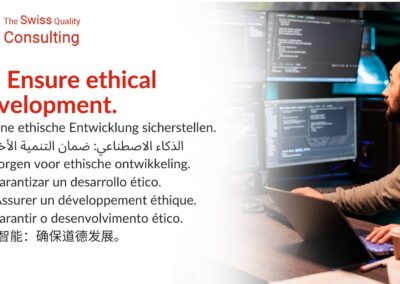Understanding the Stakes and Strategies in Software Development
The quote, “The reality of most software development is that the consequences of failure are simply nonexistent,” presents a notion that may seem reassuring at first glance. However, in the ever-evolving landscape of business and technology, the stakes in software development are undeniably high. This article delves into the multifaceted aspects of software development, exploring the critical domains of change management, executive coaching services, effective communication, and the integration of Generative Artificial Intelligence. As business executives, mid-level managers, and entrepreneurs navigate this reality, strategic approaches become paramount for ensuring success.
Understanding the Consequences in Change Management
In the intricate world of software development, change isn’t just an inconvenience, it’s a potential minefield. Failed implementations can trigger explosions of disruption, sending user confidence plummeting and productivity grinding to a halt. The stakes are high, and business leaders need to recognize the profound impact of change throughout the software development lifecycle. To navigate this challenging terrain, robust change management strategies become essential shields, deflecting the shrapnel of potential disasters.
Think of a complex software update as a delicate ecosystem. Introduce an untested change without proper planning, and you risk sending the entire system into chaos. Proactive change management acts as a meticulous gardener, carefully assessing the landscape, nurturing collaboration, and implementing changes with thoughtful, controlled steps. This ensures a smoother transition, minimizing the cascading consequences of failure:
Disrupted Operations: Imagine new features throwing wrenches into existing workflows. Change management ensures clear communication, training, and support, minimizing workflow disruptions.
Hindered Productivity: Picture developers grappling with unfamiliar tools or processes. By involving them in the change process and providing adequate training, leaders can equip their teams for success.
Eroded User Confidence: Imagine buggy updates frustrating users and tarnishing your brand reputation. Change management emphasizes thorough testing and user feedback, ensuring a seamless and positive user experience.
Implementing robust change management strategies involves:
Clear Communication: Transparent communication builds trust and reduces anxiety. Explain the “why” behind changes, actively listen to concerns, and keep everyone informed throughout the process.
Collaboration is Key: Involve software developers, testers, and other stakeholders in planning and implementation. Leverage their expertise and foster a spirit of collective ownership.
Testing, Testing, Testing: Rigorous testing mitigates risks and ensures a smooth rollout. Utilize various testing methodologies to identify and address potential issues before they impact users.
Embrace Feedback: Actively solicit feedback from all stakeholders throughout the process. Use this feedback to refine your approach and continuously improve your change management practices.
Executive Coaching Services: Guiding Success in Software Development
The importance of executive coaching services becomes evident when considering the complexities of software development. Leaders in this domain require a unique skill set to steer their teams effectively. Coaches play a pivotal role in honing leadership skills, fostering adaptability, and instilling resilience. Through coaching, software development leaders can navigate challenges and proactively address potential consequences, ensuring a path to success.
Effective Communication: Mitigating Risks Through Clarity
Communication is the linchpin in the software development process. Ambiguities and misinterpretations can lead to costly errors. Effective communication, therefore, becomes a shield against the consequences of failure. Leaders must employ transparent and concise communication strategies to align teams, manage expectations, and mitigate risks. Clarity in communication ensures that every team member comprehends their role in achieving success.
Generative Artificial Intelligence: Reducing Risks with Data-Driven Insights
Generative Artificial Intelligence (AI) emerges as a powerful ally in mitigating the consequences of failure. AI algorithms can analyze vast datasets, identify potential issues, and provide insights for informed decision-making. Integrating AI into the software development process empowers teams to detect and address risks early on, reducing the likelihood of failures and their associated consequences.
Business News Updates: Staying Informed, Mitigating Consequences
Staying abreast of industry trends and emerging technologies is integral to software development success. Business news updates serve as a crucial resource, offering insights into new methodologies, tools, and best practices. Informed teams are better equipped to navigate challenges and proactively manage the consequences of failure, ensuring continuous improvement and innovation.
Leadership and Management Skills: The Foundation of Success
Software development leaders must possess a robust set of leadership and management skills. These skills form the foundation for success, enabling leaders to steer their teams through challenges and uncertainties. The consequences of failure in software development are often rooted in inadequate leadership. Investing in continuous skill development ensures leaders are well-equipped to guide their teams to success.
Conclusion: Shaping a Consequence-Aware Development Landscape
In conclusion, the reality of software development is that the consequences of failure are not nonexistent; instead, they are pervasive and impactful. Business executives, mid-level managers, and entrepreneurs must approach software development with a consequence-aware mindset. Embracing strategic change management, seeking guidance from executive coaching services, fostering effective communication, integrating Generative AI, staying informed, and honing leadership skills collectively create a resilient framework to mitigate the consequences of failure in software development.
#SoftwareDevelopment #FailureMitigation #ChangeManagement #ExecutiveCoaching #EffectiveCommunication
























